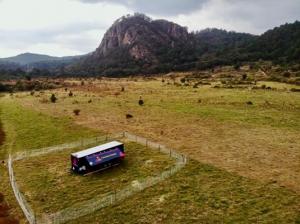Harnessing Technology and Sustainability: Chicken Camp Revolutionizes the Egg Industry
Using AI technology, Chicken Camp collects real-time information and transmits it to cloud-based servers for analysis and optimization.
HOUSTON, TEXAS, UNITED STATES, May 5, 2023/EINPresswire.com/ -- The creators of Chicken Camp are thrilled to announce the launch of their game-changing and innovative approach to harnessing technology and sustainability for the egg industry.Chicken Camp, a tech startup by Amer Technologies, is an innovative chicken coop manufacturing approach that promises to make waves in the multibillion-dollar egg industry market. Utilizing sophisticated AI technology, Chicken Camp collects real-time field site information and transmits it to cloud-based servers for analysis and optimization of AI-driven automation features using big data. This around-the-clock connectivity enables farmers to make well-informed decisions and substantially reduces labor costs and enables large-scale business expansion, allowing a single person to oversee up to twenty Chicken Camps in one day. Ultimately, this results in a production capacity of 8,000 eggs per day or a remarkable 145 tonnes annually.
“According to estimates in 2020, the United States population consumed an average of 285 eggs per person equivalent to 94.1 billion eggs or 6.66 million tonnes,” says CEO and founder of Chicken Camp, Amilkar Nunez. “As consumer and food industry demands for cage-free eggs continue to grow, assessing the egg production industry's capacity to meet consumer and food industry demands for cage-free eggs, in line with animal welfare commitments from retailers and dining establishments, is of vital importance for both industry groups and farm animal protection agencies.”
“Conventional cages pose a serious animal welfare concern, hindering hens from engaging in natural behaviors and increasing the risk of injuries due to cannibalism,” Nunez continues. “For years, animal protection groups have been advocating against battery cages by using corporate negotiations and legislative initiatives to transition egg production away from such enclosures. These initiatives have prompted food corporations to commit to sourcing cage-free eggs. Chicken Camp embraces animal welfare and presents a viable alternative to conventional egg farming by catering to the rising demand for free-range and pasture-raised eggs. This market segment accounts for 5-10% of total U.S. egg production with consistent annual growth rates.”
By prioritizing sustainability and animal welfare, Chicken Camp offers hens a safe haven at night, protecting them from harsh weather conditions and predators. During daytime, they have freedom to engage in their instinctive behaviors, enjoying fresh air and sunlight, as well as access to grass and insects - replicating conditions these animals experienced prior to industrialized egg production. The natural exposure fortifies their immune systems, eliminating the need for antibiotics or growth hormones. This environmentally friendly approach fosters soil health and prevents erosion through a responsible waste management practice using a high-rotation, less-intensive farming strategy. It creates a win-win scenario for consumers, producers, animals and the environment alike.
Additionally, Chicken Camp significantly reduces its carbon footprint by running solely on solar panels for power, eliminating the need for fossil fuels, electrical grid or expensive infrastructure to operate. This approach brings egg production closer to a minimal carbon footprint, fostering a more sustainable food production system that aligns with consumer concerns regarding ethical and environmental matters. It also promotes the farm-to-table philosophy, which emphasizes local food production to reduce transportation costs also known as food miles.
An added benefit of the Chicken Camp model is its potential to remove entry barriers for aspiring farmers, particularly in terms of land ownership. As a mobile unit, Chicken Camp allows entrepreneurs to rent or lease land without needing expensive fixed infrastructure. This flexibility makes it more accessible for young entrepreneurs who may face difficulty acquiring land for traditional farming operations while still offering an efficient egg production solution.
Chicken Camp can also serve as a catalyst for community development. By equipping vulnerable communities with the means to produce high-quality, nutrient-dense protein sources at affordable prices, this innovative approach meets dietary needs while creating economic opportunities. Excess production can be sold, stimulating local economies and decreasing reliance on external inflationary factors. Ultimately, greater self-sufficiency and food security benefits both individuals and communities at large, especially as the egg shortage continues due to the global bird flu outbreak.
After more than 10 years in the making, the Chicken Camp prototype has been granted a US patent and is currently located on a farm in San Juan del Río, Querétaro, Mexico. Excitingly, the first commercial units are scheduled for production in Q3 of this year.
Amer Technologies is eager to develop alliances and partnerships in the United States for more, exciting innovations.
For more information about Chicken Camp, please visit https://herbazal.com/.
About the Company
Chicken Camp was founded by CEO, Amilkar Nunez, a mechatronic engineer with extensive industry experience. The company’s mission is to increase the development and use of advanced technology to stimulate innovation and create new opportunities for entrepreneurs and small businesses to create new products and services, which can drive economic growth.
Citations
https://www.ers.usda.gov/data-products/food-availability-per-capita-data-system/
https://ourworldindata.org/grapher/per-capita-egg-consumption-kilograms-per-year?tab=chart®ion=Asia&country=GBR~AUS~MEX~USA
https://osf.io/z2gxn/
Amilkar Nunez
Chicken Camp
amilkar@herbazal.com
Legal Disclaimer:
EIN Presswire provides this news content "as is" without warranty of any kind. We do not accept any responsibility or liability for the accuracy, content, images, videos, licenses, completeness, legality, or reliability of the information contained in this article. If you have any complaints or copyright issues related to this article, kindly contact the author above.





